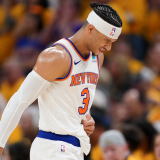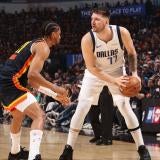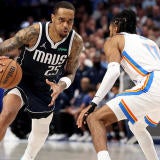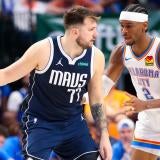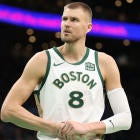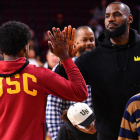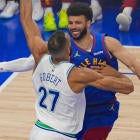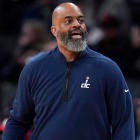On Monday, I listened to our NBA analyst, and former NBA player, Raja Bell on the Kanell & Bell podcast rip into the entitled Bulls' players for their part in the mess that has developed in Chicago. Guys who are getting paid millions of dollars to play basketball are upset they have to practice? And that those practices are too hard? Give me a break. I'm with Raja, who told a great story about when he was in Utah.
"I played for Jerry Sloan," Bell said. "This was my first stint in Utah, so it would've been 2004-05, We weren't very good. Lot of injuries. It was miserable. We weren't playing for anything. In the 70th game of the season, we were starting out practice by being down in a crab position, lower than our defensive stance, and slowly crab walking around the entire court. We were starting our shoot around by crab walking around the entire court. That just purely for, like, punishment. But guess what we all did? We did the crab walk. And we practiced for two hours. We did our damn job, and we got paid to do it."
Frankly, I expected everyone would share this viewpoint. But as I talked to people around the league, that wasn't necessarily the case. At least not unequivocally. Two people in the NBA, and one recently removed from the league, told me they have never seen a team practice after playing back-to-back games, let alone go seven straight days with either a practice or a game. It's unheard of these days. And running wind sprints? No way.
Say what you want about how ridiculous this sounds -- that professional basketball players who get paid millions of dollars, and in many cases tens of millions, would actually complain to their union about having to practice too often, and apparently too hard -- but this is the new NBA reality. It's a players league. It was suggested to me that this is, in large part, about money. Guys don't want to get hurt, obviously, when they have a short window of time to maximize their basketball earnings, and in this scientific/analytical age, we know that overworking athletes leads to injury. At the very least, it can lead to playing games at less than full capacity, and the games are where guys make their money. Their next contract. So on and so forth.
Again, this is hard for regular folks to relate to, and I'll be clear, I don't agree with it, either. These players make a ton of money, to state the obvious. The lowest paid full-time player on Chicago's roster, Shaquille Harrison, is making $1.27 million this season. The highest-paid player, Jabari Parker, is making $20 million. You can practice. Even when you're tired. On some level, this is a cop-out by a team that is tired of losing and is just plain tired, and they didn't feel like practicing, plain and simple.
At least, that's the way I see it.
But an executive on another team told me that in cases of internal conflict, he's been around the league long enough to know "there are always three sides" to the story: The players, the coaches, and the management -- and each have a different perspective. This, in the end, is about relationships and trust. I remember talking to Warriors Assistant GM Larry Harris about how Steve Kerr continues to hold his proven, star player accountable, and he said those two words over and over. Relationships and trust. That's how he can get on Draymond Green's case with credibility, and empathy, because they trust one another. They have a relationship that has been cultivated, and earned, over a long period of time.
The bottom line is that none of the three parties involved in this Bulls mess have earned the trust of the others. Think about it: The front office, namely John Paxson and Gar Forman, has made a series of puzzling decisions, which have largely led the organization to this point. The new coach, Jim Boylen, has referenced multiple times the demanding tactics Gregg Popovich used when Boylen was an assistant coach on Popovich's staff in San Antonio -- but as Boylen's new players have pointed out to him, Boylen is not Popovich. He hasn't earned that level of credibility. He's been a head coach in the NBA for less than two weeks.
And finally, the Bulls players certainly haven't earned the respect, or leeway, they think they deserve. They lost by 56 points to the Celtics last week for crying out loud. It was the worst beating in franchise history. They have the second-worst record in the NBA. They're the worst team in the Eastern Conference. What you have here are three parties, with three different perspectives, with only one thing in common during their tenure with the Bulls: Losing.
And that's what this comes down to. If this is going to get better, the Bulls have to stop losing. They have to at least show signs that they are heading in the direction of winning. Bulls management has reportedly given Boylen the green light to lay the hammer down on these players, to push them harder and demand more of them than the more easy-going, and recently fired, Fred Hoiberg. But if this team doesn't start moving forward in a positive direction at the very least, the coach will not win this battle. The future of this team is Zach LaVine, Wendell Carter Jr. and Lauri Markkanen. The future is not Jim Boylen. It's a players league, like it or not.
Should Paul George be getting MVP consideration?
Like everyone else, when I think about the MVP conversation at this point in the season, my mind goes right to three names: Giannis Antetokounmpo, LeBron James and Stephen Curry. After that, I think about Kawhi Leonard and Joel Embiid. If I really stretch it, I can see Nikola Jokic in there, as well. If I was going to include a Thunder player, I would go to Russell Westbrook. But Monday night, I was watching Paul George systematically dismantle the Jazz for 31 points on 8-of-10 shooting (including 5 of 6 from three) while texting with a league source. The question was posed to me: Why aren't we talking about George as an MVP candidate?
I thought about it, and it's true. George should be in the MVP discussion at this point. He's the perimeter anchor on the best defense in the league, and entering Monday, he was the only player in the NBA averaging at least 24 points, eight rebounds, four assists and two steals per game. Since starting the season 0-4, the Thunder have gone 17-4 and are sitting on top of the Western Conference standings, percentage points ahead of the Warriors.
The Thunder look, and feel, like an entirely different team than the one that squeaked into the playoffs last season before getting bounced in the first round by Utah. Carmelo Anthony is gone, and that, to be honest, might be the biggest factor of all. He just killed them defensively and was an unnecessary offensive interruption. Sliding Jerami Grant into Melo's spot in the starting lineup has been a monster upgrade on both ends. Newcomer Dennis Schroder has also been huge. Westbrook has been his usual self. Steven Adams should be an All-Star and a legit Defensive Player of the Year candidate, even if he likely won't receive either honor.
But all things considered, George has been the best player on one of the best teams in the league. Isn't that the definition of an MVP?
Joel Embiid's role is a changin'
First off, it's not that dramatic. Embiid isn't turning into a point guard or anything. But he is playing a little more on the perimeter since the Jimmy Butler trade, and he's not exactly thrilled about it.
"I haven't been myself lately," Embiid recently told reporters, via the Philadelphia Inquirer's Keith Pompey. "I think it's mainly because of the way I've been used, which is I'm being used as a spacer, I guess, a stretch five, which .. I'm only shooting (29) percent from 3-point range.
" ... (76ers coach Brett Brown) always has me starting on the perimeter … and it just really frustrates me.
"... Since the trade, it's been really down. I was in the flow of the offense. I feel like I'm not anymore. There's not a lot of possessions on the block. I don't know. We got to figure it out."
Really, this isn't about Embiid. It's about Ben Simmons. After the Butler deal, I asked Brown how the trade was going to change things for Simmons, who has predictably relinquished some control of the offense to Butler. Brown said that he was going to use Simmons along the baseline, as a dunker in position for lobs and drop-offs, as a cutter and an unleashed offensive rebounder, and he has done those things. Simmons is playing terrific since the trade.
But recently, Brown also correctly pointed out that the NBA has become a four-out, if not at times a five-out, league, meaning at least four guys on the perimeter at all times, which spaces the floor and opens the lane for penetrators. In other words, the days of having two guys clogging up the paint are over. So it's simple: Simmons and Embiid can't be in the lane at the same time, and considering Simmons is an absolute non-threat outside of 10-12 feet and thus won't occupy a defender beyond that range, he has to stay closer to the basket. That pushes Embiid out.
Now, from a statistical standpoint, there has been absolutely no change to Embiid's interior shot distribution. Before the trade, he was averaging 10.8 shots per game in the paint; after the trade, he's averaged the same 10.8 shots per game in the paint. The big change has been in the production: 28.2 points per game on 48-percent shooting pre-trade, 23.8 ppg on 42-percent shooting post-trade.
Understand, just because Embiid is getting the same amount of paint shots doesn't mean he's getting the same kinds shots. Embiid is a monster in traditional post spots -- on the block, back to the basket -- and perhaps he's finding himself having to put the ball on the floor a bit more to get to his comfort zones, or operate more as a roller or short pick-and-pop guy, all of which he is very capable of doing at a high level.
It's just an adjustment. Great players, deservedly so, want the ball on their terms, in their spots, and Embiid has perhaps had to sacrifice in this way. This is the reality of playing with Simmons, who's a spectacular player, but there is always going to be that extra challenge of keeping proper spacing with him on the floor, particularly when he's off the ball and not orchestrating the offense from up top as often, which naturally kept him more to Embiid's area before Butler arrived.
Let it be said that Embiid is not, in any way, complaining about the trade or prioritizing his stats or touches over the team. The Sixers are playing extremely well. They're 10-3 since Butler joined the team, and they now have a one-on-one player in Butler that will make them an entirely different animal in the playoffs. Embiid knows this. He's just frustrated not being able to do what he's used to doing, or at least how he's used to doing it.
The Sixers will figure this out. When the Butler trade went down, I talked at length with a league scout about all the changes it was likely to bring about for the Sixers. The scout was confident Brown would figure it all out in due time, and by the playoffs, they'll be getting the most out of their main guys. Brown is smart. He's very aware of everything and very open in discussing it in a way that most coaches aren't. And Embiid, also, can do some things to compensate in the short term. For one, he can run the floor hard and establish early post-position. He can avoid settling for 3-pointers and continue to put the ball on the floor. He can roll hard and hammer ball-screen switches in the post.
People will talk about how this might affect Butler's decision to re-sign with Philly if this chemistry doesn't come together, but I think that's a major stretch to go there this early. This is working pretty damn well. The Sixers are winning. Everyone sacrifices something on a winning team. You don't think Stephen Curry would like to still be shooting all those crazy pick-and-roll shots he used to get all the time before Kevin Durant showed up? If the Sixers keep winning and carry that over into some real playoff success, Joel Embiid isn't going to care about a couple fewer shots or touches on the block.







